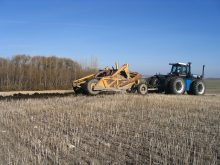In 2017, a farmer in eastern Manitoba found a giant ragweed plant that seemed to have immunity to glyphosate.
A sample of the weed was sent to a lab, but by the winter of 2018 it still wasn’t known if the weed was resistant to glyphosate.
That’s because it can take months to determine if a weed is resistant to a herbicide.
Not anymore.
Martin Laforest, an Agriculture Canada weed scientist in Quebec, has developed a new test that reduces the time it takes to get a positive or negative.
Read Also

Pakistan reopens its doors to Canadian canola
Pakistan reopens its doors to Canadian canola after a three-year hiatus.
“With just a few fresh leaves from a weed plant, a technician can determine whether resistance genes are present in less than two weeks,” said Laforest, who works at the research centre in Saint-Jean-sur-Richelieu.
“Producers will benefit from this new detection method. It will help to slow the development of herbicide resistance and support the implementation of strategies for managing this problem quickly and limiting its economic impact.”
The new test is based on molecular markers, or fragments of DNA found at certain locations in the genome.
Laforest discovered genetic mutations linked to resistance and then developed a set of molecular tests to identify herbicide-resistant plants more quickly than conventional methods.
There have been 118 cases of herbicide resistant weeds in Canada, based on the International Survey of Herbicide Resistant Weeds.
Western Canadian weed scientists are particularly concerned about kochia that is resistant to glyphosate, which is the active ingredient in Roundup.
In Manitoba, many of the municipalities in south-central Manitoba now have glyphosate-resistant kochia and the problem is getting worse.
“We’re not doing a great job of managing (it),” said Tammy Jones, a Manitoba Agriculture weed scientist.
A rapid test would help identify the problem more quickly so that producers could take immediate action and prevent further spread.
“A zero-tolerance policy should be adopted,” Agriculture Canada said in a news release.
“Every resistant weed plant that is not destroyed will add seeds to the soil seed bank, thereby compounding the problem of resistance.”
The Quebec government offers the test to farmers in that province, and Ontario’s agriculture ministry may soon make it available there as well.
Western Canadian producers will have access to the test but not right away, Agriculture Canada said.
“Early detection using the molecular markers developed by AAFC is an approach that will be shared with the other Canadian provinces in the medium term.”















